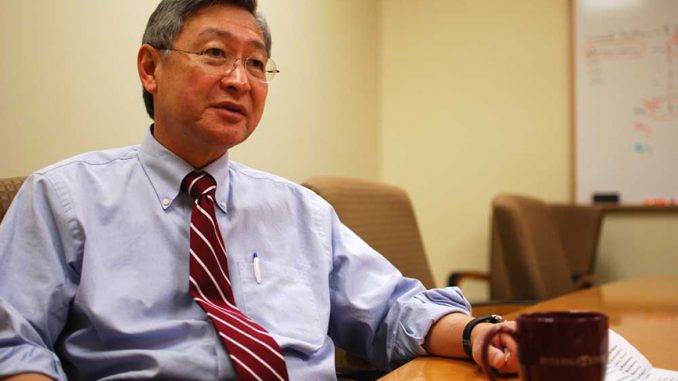
On Monday, Hai-Lung Dai sat at the head of a large conference table on the sixth floor of the Science Education and Research Center, a building he helped envision when he was dean of the College of Science and Technology.
He looked comfortable.
Four days earlier, the university announced that Dai, who had been removed from his role as provost in June 2016, would be reinstated among administrators in a newly created position as the vice president for international affairs.
He will take up the position later this year, according to a statement from Board of Trustees spokesman Kevin Feeley.
Dai said the role will follow the tradition of other international affairs offices, but that he is still waiting to meet with President Richard Englert, who he will report to directly. Englert will define the responsibilities of Dai’s new role.
The office will operate the Study Abroad and Intensive English Language programs, as well as support the operation of Temple’s two international campuses and multiple international programs. It will also manage the admissions process for international students and work with Temple’s “partner universities,” which provide academic and degree programs through exchange programs.
“In a word, this office is responsible for the globalization of Temple,” he said.
Dai’s return is part of an agreement between the former provost and the university after his unexpected removal in June.
Dai said he could “neither confirm nor deny” that he received money as part of the deal to come back to the administration.
The statement from Feeley added that the university hired a third-party law firm to investigate a sexual harassment claim against Dai, which was made public on July 12, when the Board cast a vote of “no confidence” in former President Neil Theobald. At the time, Feeley said Theobald had emailed the Board saying that he refused to cover up the harassment allegations against Dai and that his removal was a retaliation.
Dai released a statement on July 13 saying that the complaint against him was for “retaliation” and had been “characterized as a sexual harassment complaint and publicly linked to [his] removal as provost.”
“In the last several weeks I have stood silent and watched my personal and professional reputation be shattered by lies, half-truths and malicious innuendo because I trusted that truth would emerge from slander,” the statement read. “But after yesterday’s events, I can no longer remain silent.”
Dai wrote that the complaint against him “was not filed until well after the president had informed me that he wanted me to step down as provost.”
On Monday, Dai said his last meeting with Theobald was on June 10, when they discussed his removal as provost. Dai said he learned about the harassment claim on June 17 and that the removal was “already in process.” Theobald officially removed him as provost on June 28.
Feeley’s statement on Friday said that the third-party law firm that investigated the harassment claim against Dai concluded “that the complaint could not be substantiated.”
Dai said the claim stemmed from a verbal comment he made seven years ago to an employee, whom he had disciplined for mistakes she made while working in CST. Dai said he reassigned the employee to another department, and she claimed the reassignment was retaliation.
He added that the law firm determined that even if the comment he made was substantiated, it would not have been considered sexual harassment.
The employee still works for Temple, Dai said.
In June, Feeley said the Board removed Theobald because he failed to inform the Board of a growing deficit amounting to more than $22 million in the university’s merit scholarship program.
Theobald resigned a week later on July 21, two hours before the Board was scheduled to vote on his removal.
The summertime conflict culminated in a September lawsuit in which Dai filed claims against Theobald for slander, misrepresentation and libel. Court records show that he sued for more than $50,000.
In his July statement, Dai said he would “not rest or retreat until [he has] pursued every avenue available to [him], including through a court of law.”
Because Theobald was president when he publicized the harassment claim against Dai, Temple was pulled into the civil lawsuit.
The agreement reached between Dai and the university effectively puts that lawsuit to rest.
Dai said the resolution of the lawsuit outside of courtrooms was to avoid “putting the university in the spotlight.”
“I’m very grateful to both the Board, primarily to the Board, and the university,” Dai said. “They gave me the chance again so that I can dedicate myself to [Temple’s] mission.”
Julie Christie can be reached at julie.christie@temple.edu or on Twitter @ChristieJules.


Be the first to comment